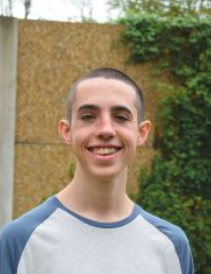 Alex Torrez received FFRF’s $1,000 Student Activist Award, endowed by a generous couple in the Northwest who prefer anonymity.
Alex Torrez received FFRF’s $1,000 Student Activist Award, endowed by a generous couple in the Northwest who prefer anonymity.
By Alex Torrez
I’m a home-schooled high school junior and I’ve been competing in national circuit Lincoln-Douglas Debate competition for three years. I’m also an atheist.
Debate has caused me to dramatically change the way I look at the world and converse with others. It’s the single most important thing I’ve done since I started high school. We debate a resolution that changes every two months, but usually revolves around a proposed policy, such as “The United States should implement a federal jobs guarantee,” or “States ought to abolish their nuclear arsenals.” When Covid-19 hit, debate went from being an in-person activity hosted by high schools and colleges around the country to an online platform. The first major online tournament was hosted by Strake Jesuit High School in Texas. It drew nearly 200 participants, making it one of the most highly attended tournaments of the year.
After signing up, I was sent to the rules page. The rules for this tournament — the first of its kind — specifically allowed debaters to use profanity, unless that profanity was “blasphemy” or “directed toward others and/or God or the saints and angels.” This tournament put three expressly Christian rules ahead of the rule prohibiting child exploitation or threats of physical harm!
I was shocked. But then I realized that this was the perfect opportunity to use my experience as both a debater and an atheist to not only raise awareness about atheist voices in debate, but also to call attention to the very real possibility that we could be excluded from all major debate tournaments going forward if they modeled themselves after this one. I couldn’t let that happen.
Like any good debater, I started by doing the research. I found peer-reviewed academic literature by psychologist Will Gervais showing that atheists are viewed as negatively as rapists. I read psychology journals proving that people are biased in favor of moral arguments when made by theists and against those same arguments when made by atheists. I also found evidence of real-world violence against atheists. But I still wasn’t sure how to turn all of that into a coherent debate case.
Then it hit me: civil disobedience. I was going to break the rules — and encourage others to break them too. I was going to accept whatever punishment they handed down for breaking them, and I was going to change this event forever. Rule 2 specified that profanity was OK, as long as it wasn’t directed towards others.
Here’s how I opened my speech: “Fuck God and all his stupid fucking angels!” (I didn’t say I was subtle.)
Then, I ran my case. I explained the research, and I wove everything together into an argument for why the judge had to join me in civil disobedience to protest. To be honest, I don’t think I’ve ever debated as well as I did in that round. And, after I finished my last speech and sat down, I looked at the server and realized that more than 50 people had joined the online room as observers! My room. Throughout the round, word had spread and people gathered to watch.
I lost that round. Ten minutes later, I was kicked out of the entire tournament for violating the rules.
For a second, I was hurt. I was the better debater. I wanted to win. But then I saw the bigger picture: 50 people learned something that day. A judge asked me for a copy of my case. People noticed.
Since that day, there have been dozens of online debate tournaments, including another one hosted by Strake Jesuit. And you know what? None of them use those bigoted rules. Now, I don’t know how much of that is due to my civil disobedience (if any), but I’m proud that I was the first person to raise the issue.
I’m a debater, and I’m an atheist.
Alex Torrez, 18, is a homeschooled 11th-grade student from Arbutus, Md. When not competing in high school debates, Alex enjoys designing board and card games, as well as playing a variety of other tabletop games such as Magic: The Gathering.

